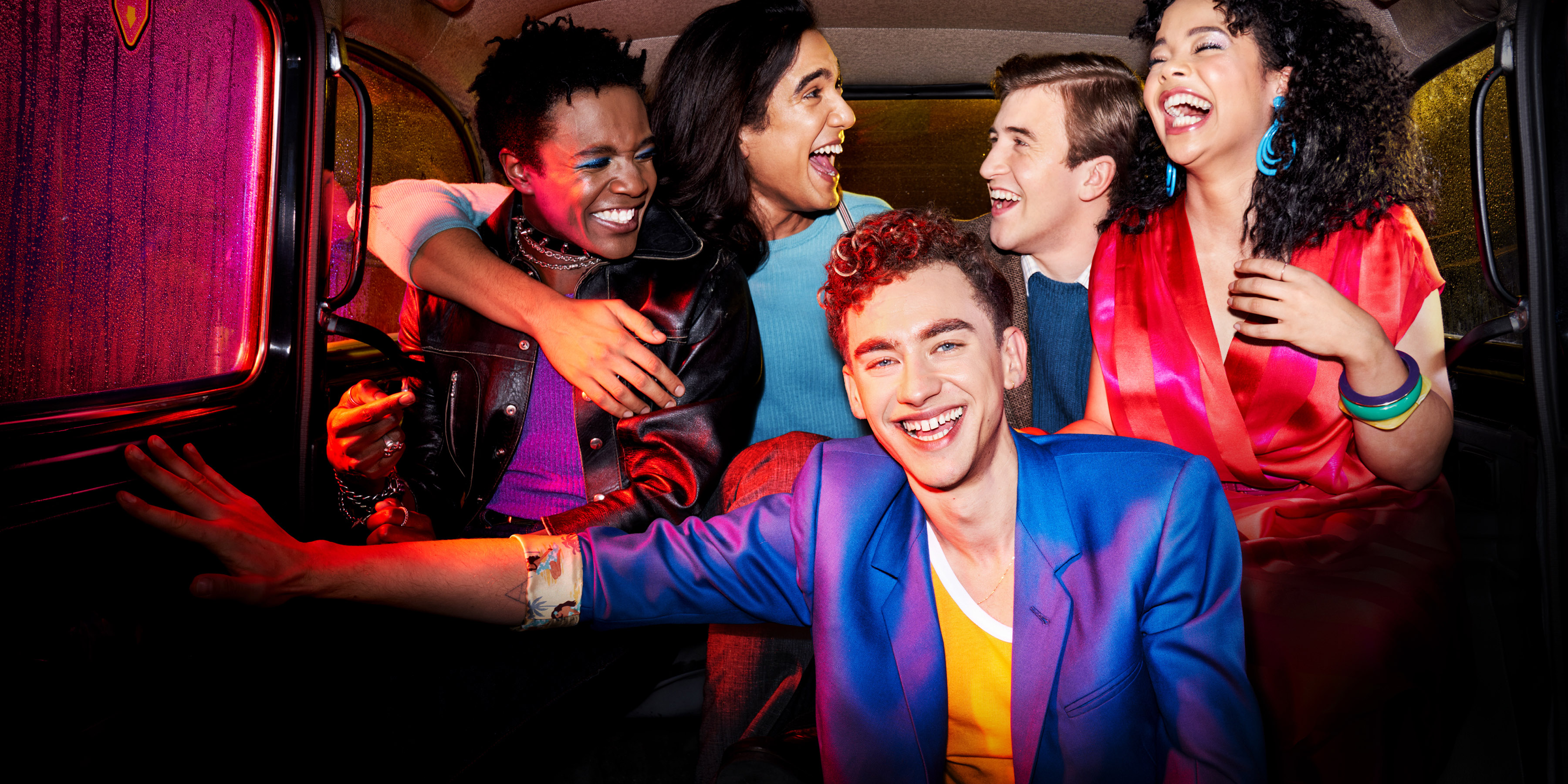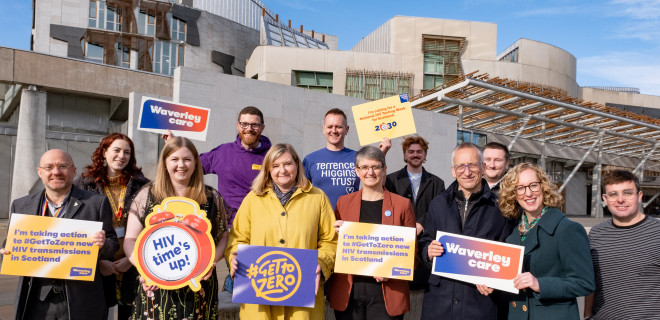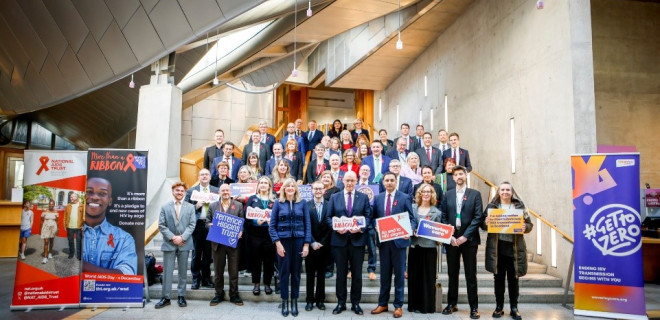
The series finale of It’s A Sin aired a few weeks back, and if we had it our way, it would have never ended. To mark the series finale and keep the conversation going after the show finished, we held a special live Twitter Q&A about the show.
We enlisted the help of cast members Olly Alexander and Nathaniel Hall to answer your burning questions, as well as HIV activist and commissioner Mercy Shibemba.
They spoke about their reactions to It’s A Sin’s tremendous success, how they believe the show has changed mainstream conversations about HIV and what they wish everyone knew about HIV.
Did you miss the Q&A? Don’t worry! To spare you from trawling through our Twitter feed, we’ve created a summary of their answers. Grab a mug of something hot, put your feet up and keep reading!
What’s the reaction to the show been like, and has it surprised you?
LIVE IT'S A SIN Q&A!✨
We’re very excited to be joined by @alexander_olly, @NathanielJHall & @mercyshibemba to answer your Qs about this amazing show!! Join in using #ItsASin.
Let’s get going with the 1st Q – what’s the reaction to the show been like and has it surprised you? pic.twitter.com/DPO2priLry— Terrence Higgins Trust (@THTorguk) February 19, 2021
Nathaniel: For me, it’s been really apparent that the show uncovered a still-healing wound in the LGBTQ community - it was so raw for so many. But it's been incredibly validating to see what has mostly been a hidden part of our history so loud and proud on-screen during LGBT History Month.
I was also worried the show would allow old myths and stigmas to resurface... but actually, the opposite has happened. The whole nation is talking about how HIV has changed! It’s amazing!
Mercy: As a viewer... seeing the reactions to It’s A Sin and how the show has ignited challenging, heartbreaking and inspiring conversations - has been amazing. I am looking forward to the narrative about HIV continuing to change as a result of this.
Olly: I’ve been totally blown away to be honest, I thought the show was brilliant when I read the script but I didn’t expect the response it’s had!
It’s exposed a need for these conversations to happen and how much pain has gone on in silence for so many people. And like Mercy says, I really hope this helps move the narrative around HIV to a better place.
What has been the biggest change in the conversation around HIV since the series began?
It's been everywhere! Good point Mercy on the 'narrative about HIV continuing to change'.
Because the next question we've had through for you all is: What has been the biggest change in the conversation around HIV since the series began do you think?— Terrence Higgins Trust (@THTorguk) February 19, 2021
Mercy: The biggest change I’ve seen as a young person has been an understanding from my peers of just how bad stigma is. Lots of people assume HIV stigma is over, unfortunately not much has changed.
The isolation depicted in It’s A Sin is still very real and felt by many people living with HIV today and I think the show has helped people understand that. It's so important that these stories get told.
Nathaniel: I agree with Mercy... stigma is still very much present, including self-stigma. It took me nearly 15 years to tell my family I was HIV+ and we are all really close and supportive of one another.
I've been bowled over by the response to the show and am honoured that I've been given such a platform to talk about HIV at this time, but I'm also keen to remind people that it doesn't just affect gay men and that stigma in many other communities keeps HIV very much hidden.
Olly: I think lots of people have an idea about HIV but don’t necessarily know how deeply the stigma has affected communities, I’ve been having conversations with people who feel guilty for not knowing what happened, but so much happened in silence.
Mercy, do you have any thoughts on why we don't hear more stories about women with HIV?
It's definitely really important to talk about what hasn't changed in HIV as well as what has.
As a follow up question, we've had this one for Mercy: do you have any thoughts on why we don't hear more stories about women with HIV?
We know you're doing great work ? pic.twitter.com/l01Vu3vgDP— Terrence Higgins Trust (@THTorguk) February 19, 2021
Mercy: Women make up a third of people living with HIV in the UK. Yet are often overlooked, ignored and excluded. Much is at risk when certain narratives are continually shut out of conversations they should be centred in. Women are done a disservice by not being perceived as at risk.
HIV is a virus and to be honest, cares little for whoever you may be. Simply put, we don’t hear more stories about women with HIV because those with resources and access to share these stories often lack these voices leading the conversations in the room.
We need people to look around the room whenever sharing stories and capturing the history (and present) of the community of people living with HIV. Asking: Who has been left behind and why? We have to do better than this!
Nathaniel: Amen to that! What can people like me (gay men with HIV) do to help amplify women? How can we be better allies?
Mercy: I think it's about passing the mic and challenging the spaces where other voices are missing, but there's so much more to it than I can tweet!
Nathaniel: Agreed. I'm always conscious that I don't speak on behalf of others. But I'm aware of some of the challenges other people with HIV face because of the communities they come from where stigma is even more present. But seeing awesome women like you will continue to inspire others!
What was the most emotional scene to perform and impacted you the most? (and Mercy, for you as a viewer?)
Thanks Mercy. We looked at stats that show #ItsASin binge-watchers were Googling for information about the impact of HIV on women after watching.
Next Q from @vikkiphillips7: what was the most emotional scene to perform and impacted you the most? (& Mercy, for you as a viewer?)— Terrence Higgins Trust (@THTorguk) February 19, 2021
Olly: The most emotional for me was probably the end of episode four when Ritchie tells his friends his status, and in episode 5 when he hugs his mum, I was sobbing like an ugly person for real in that one!
Mercy: The scene where they all answer where they want to be in X amount of years!!! Totally broke me.
As a child growing up with HIV, I actually got to answer those questions knowing I'd live to see my dreams... Many others with HIV still don't have that.
And watching how hard it was to get the latest information on HIV. My favourite resources growing up were aidsmap and Avert - SO lucky to have grown up with them as close as a google search away
Olly: That’s really moving to hear Mercy - whenever I thought about Ritchie and his future I would cry!
Nathaniel: I was quite thankful that Donald didn't have scenes at the clinic or in hospital (there's enough of them in my own solo show!)... filming my final scene when Ritchie ignores Donald was hard but mostly because of the torrential Mancunian rain!
We had a lovely message from someone who has decided to start taking PrEP since watching the show. They asked what can be done to raise awareness of PrEP and if you think Ritchie, Donald and co would've taken it?
We had a really lovely message for this Q&A from someone who has decided to start taking PrEP (which you take to protect from HIV) since watching the show. They asked what can be done to raise awareness of PrEP and if you think Ritchie, Donald and co would've taken it? #ItsASin
— Terrence Higgins Trust (@THTorguk) February 19, 2021
Olly: Shout out to PrEPster and the Gay Men’s Health Project who are just two places doing great work on this! There are some great resources available for people to make the right choice for them.
I think Ritchie would have taken it but it’s hard to imagine PrEP in the 1980’s and whether or not he’d have found the information and be confident in speaking to a healthcare professional about it! I’m so thankful that things have changed!
Mercy: Love this. So glad the show is doing this.
Women and PrEP is a fab place if you’re a woman thinking about PrEP!!
Nathaniel: It's incredible that the show has had this impact. For my whole adult life, I had to carry the burden of HIV and not passing it on. Now with PrEP, the burden is shared. My new boyfriend just told me really casually on our first date and honestly, I fell madly in love because there was this huge relief that it wasn't just MY responsibility to protect my sexual partners. He shared that with me. And I think that's just amazing.
I think Donald (like most of us) wants to be safe and respectful during sex. But we're not given the tools to navigate these conversations. Putting on a condom can be fun and sexy! Navigating what you like and don't like in bed is too.
But I think there is a lot of shame around talking about sex (especially gay sex) so for many of us, we don't have the confidence to talk about it with our partners. These days I have learnt that confidence and want others to know it's OK to say no, or insist on condoms.
The show’s soundtrack is amazinggggg. What’s your favourite song from the series?
Let’s all keep shouting about PrEP!
The show’s soundtrack is amazinggggg. What’s your favourite song from the series? #ItsASin— Terrence Higgins Trust (@THTorguk) February 19, 2021
Olly: DO YOU WANNA FUNK by Sylvester!!!! It melts my mind and sends me into the stratosphere!
Nathaniel: I was literally going to say the same thing!... it's on my workout playlist and when I heard it in the show I did a little scream of joy.
Olly, Nathaniel, Mercy: If you could tell everyone in the world one thing about HIV, what would it be?
Rubbishly, it's time for the final question of our #ItsASin Q&A that we had a bunch of times!!
Olly, Nathaniel, Mercy: If you could tell everyone in the world one thing about HIV, what would it be?
Our pick ? pic.twitter.com/cSnjpNJeHA— Terrence Higgins Trust (@THTorguk) February 19, 2021
Mercy: My one thing would be that stigma kills and needs to be challenged. It’s A Sin might be set in the 80s, but as a 22-year-old who’s lived with HIV her whole life, it was all too familiar. These are some ways it shows up for me...
In my inability to meet someone's eyes when I’m sharing my status. When I trip up on my words, struggling to explain that HIV has changed. The shame that seeps in when questions loaded with blame, are the response to my status. At times, being unable to say *those* 3 letters.
I feel lucky to have been able to share my status. But the stigma still reminds me of my perceived place in society. People still hold tightly to their perceptions of people living with HIV and they are often dehumanising. They ‘other’ us and cast us aside.
So, remember when you watch art like It’s A Sin and in your subsequent conversations, combatting stigma is so important. It centres the humanity of people living with HIV, so often erased by the unflinching hatred of the communities impacted by HIV. Without stopping this people living with HIV cannot live normal, happy healthy lives and the issues will continue to be cyclical. (Can you tell I'm fired up, lol?) but basically - HIV would be less of a problem without stigma!!!
Nathaniel: As a person living with HIV on effective medication, I'm the safest person you could be having sex with (just don't tell my boyfriend)
Oh and remember to strut with your head held high every time you walk into the clinic to have your STI check-up... being empowered in your own sexual health is something to be proud of
Olly: I totally agree with all of you, Mercy is absolutely right - the stigma is the issue, not HIV!



